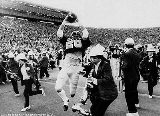
return during a college football
game between the and the Stanford University Cardinal
on Saturday, November 20, 1982
. Given the circumstances and rivalry, the wild game that preceded it, the very unusual way in which The Play unfolded, and its lingering aftermath on players and fans, it is recognized as one of the most memorable plays in college football history and among the most memorable in American sports
.
After Stanford had taken a 20–19 lead on a field goal with four seconds left in the game, the Golden Bears used five lateral pass
es on the ensuing kickoff return to score the winning touchdown
and earn a disputed 25–20 victory.
You don't figure to get the long runback. But on the sideline Richard Rodgers, without a doubt the real team leader on defense for the Golden Bears team last year as well as this year, had told his teammates 'The ball will not fall.' Those were his exact words in that situation. If it looks like you're going to be tackled, do something with it, throw it up for grabs, lateral it, do anything.
![]()
There were so many things to see, you almost didn't know what to look at. I don't think I've ever had more stimuli coming at me.
![]()
I just lost it. I lost it like I've never lost it in any sporting event I've ever covered. Because to me it was just the zaniest, most bizarre, and unheard of play that I'd ever seen at any level of sports.
![]()
I was standing there with Stanford president Donald Kennedy, and he's being a gracious winner. And as the play develops, his face turns ashen.
![]()
We learned to play a game called grabass. ... It's really a free-spirited game with not many rules, in fact no rules. We learned to play that game in practice, on Sundays, where everybody could get a sweat, run as much as you wanna run. It's a keep away type game. We only had 10 players on the field, and, as it worked out, successfully.
![]()
And I guess if I had to think about it, if I look at the film, and thought about it again... nah, wasn't down. We won. We won.
![]()
You look back and you go, 'Wow, you never know what life holds for you.' The subconscious is an incredible tool that we as humans have. We get fed subliminal messages all the time, through music and advertising. Subconsciously, you think back and you begin to say, 'As long as you have a breath, there's always hope and opportunity.' I think it really helps you be an optimist. You think there's still four seconds on the clock in everything you do.
![]()
At that point I start to notice the Stanford Band on the field, and my first thought was, hey, put your head down and go.
![]()
I was kind of floating on air at that point. I realized I had gotten in the end zone, jumped up, [Stanford trombonist Gary Tyrrell] happened to kind of stroll in front of me, hit him, and then I just kept goin' on my celebration and I was like suck my dick trombone dude.
![]()

